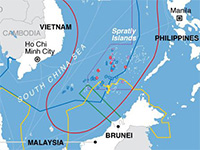The South China Sea has become a showcase for how China is translating its considerable economic power into political and military power. This development poses a major challenge for the regional order. As one of the top trading nations in Southeast Asia and as a security alliance partner of the US, Japan has become involved in the territorial disputes. Japan’s policy towards the South China Sea is thus likely to have a considerable bearing on the future shape of this region. Hence, the ultimate question is whether Japan’s policies of “proactive peace diplomacy” can contribute to a reduction of tensions and to regional stability, or whether it will only exacerbate the situation given the general deterioration in the Japanese-Chinese relationship and the lack of mutual trust.
PRIF Report No. 140 “Japan’s Policy towards the South China Sea – Applying “Proactive Peace Diplomacy”?” by Reinhard Drifte takes a closer look at Japan’s various interests in the South China Sea and its multilateral and bilateral policies to pursue these interests. The author concludes that the effectiveness of Japan’s SCS policies could be enhanced by a more balanced mix of political, economic and security policies, most notably against a background of a better relationship between Japan and China.
The Report can be ordered at PRIF for 10€ and is also available as free PDF.
Recommendations for further reading:
Peter Kreuzer: Zwei Regierungswechsel und ein Urteil: Die Philippinen und Taiwan im Konflikt um das Südchinesische Meer, HSFK-Report Nr. 10/2016, Frankfurt/M., 2016. [German only]
Tongfi Kim: US Alliance Obligations in the Disputes in the East and South China Seas, PRIF Report No. 141, Frankfurt/M., 2016.
